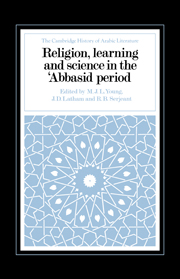Book contents
- Frontmatter
- Epigraph
- Contents
- List of plates
- Editorial preface
- List of abbreviations
- Map Literary, political and religious centres in the ʿAbbasid period
- 1 Sunnī theology
- 2 Shīʿī theological literature
- 3 Ibāḍī theological literature
- 4 Quranic exegesis
- 5 The prose literature of Ṣufism
- 6 Philosophical literature
- 7 Arabic lexicography
- 8 Arabic grammar
- 9 Islamic legal literature
- 10 Administrative literature
- 11 Arabic biographical writing
- 12 History and historians
- 13 Faṭimid history and historians
- 14 Mathematics and applied science
- 15 Astronomy
- 16 Astrology
- 17 Geographical and navigational literature
- 18 The literature of Arabic alchemy
- 19 Arabic medical literature
- 20 Al-Kindī
- 21 Al-Rāzī
- 22 Al-Fārābī
- 23 Ibn Sīnā
- 24 Al-Bīrūnī and the sciences of his time
- 25 Al-Ghazālī
- 26 Christian Arabic literature in the ʿAbbasid period
- 27 Judaeo-Arabic literature
- 28 The translation of Greek materials into Arabic
- 29 Didactic verse
- Glossary
- Bibliography
- Index
29 - Didactic verse
Published online by Cambridge University Press: 05 July 2014
- Frontmatter
- Epigraph
- Contents
- List of plates
- Editorial preface
- List of abbreviations
- Map Literary, political and religious centres in the ʿAbbasid period
- 1 Sunnī theology
- 2 Shīʿī theological literature
- 3 Ibāḍī theological literature
- 4 Quranic exegesis
- 5 The prose literature of Ṣufism
- 6 Philosophical literature
- 7 Arabic lexicography
- 8 Arabic grammar
- 9 Islamic legal literature
- 10 Administrative literature
- 11 Arabic biographical writing
- 12 History and historians
- 13 Faṭimid history and historians
- 14 Mathematics and applied science
- 15 Astronomy
- 16 Astrology
- 17 Geographical and navigational literature
- 18 The literature of Arabic alchemy
- 19 Arabic medical literature
- 20 Al-Kindī
- 21 Al-Rāzī
- 22 Al-Fārābī
- 23 Ibn Sīnā
- 24 Al-Bīrūnī and the sciences of his time
- 25 Al-Ghazālī
- 26 Christian Arabic literature in the ʿAbbasid period
- 27 Judaeo-Arabic literature
- 28 The translation of Greek materials into Arabic
- 29 Didactic verse
- Glossary
- Bibliography
- Index
Summary
Arabic didactic verse (shiʿr ta līmī) aims solely at teaching a particular genre of knowledge. Many Arab critics do not regard it as true poetry, since it is devoid of emotion and imagination, both of which are essential constituents of poetry, besides metre and rhyme. In other words, they consider it as versified prose.
Didactic verse is instructive, adding to one's knowledge and aiming at improving one's morals. It pleases the ear and aids the memory. It is known to go as far back as the dawn of Greek history. In all probability, the Greeks borrowed the idea from the Sumerians, as so much of Greek civilization is traceable to ancient Mesopotamia. But the Arabs were influenced in this, as in so many other cultural aspects, by the Greeks and the Indians, rather than by Mesopotamia. Arabic didactic verse may be categorized under the following headings:
1 Epigrammatic and gnomic verses (i.e. pertaining to maxims or aphorisms) that date back to the time of the Jāhiliyyah, for which Zuhayr b. abī Sulmā, al-Nābighah al-Dhubyānī (d. AD 604) and Labīd b. Rabīʾah were well known.
2 Fables, parables, songs, riddles, maxims, proverbs, monologues and dialogues, particularly of the ʾAbbasid era. An example of this kind of literature is the Dīwān of Umayyah b. abī ʾ1-Ṣalt (d. c. 9/630), whose didactic verses were turned into prose by al-Jāḥiẓ.
3 Theological, medical and grammatical treatises which cover a wide range, for example, the Alfiyyah of Jamāl al-Dīn Muḥammad b. Mālik, 1,000 verses in rajaz metre to help students to learn by heart the intricacies of Arabic grammar.
[…]
- Type
- Chapter
- Information
- Religion, Learning and Science in the 'Abbasid Period , pp. 498 - 509Publisher: Cambridge University PressPrint publication year: 1990
- 1
- Cited by



